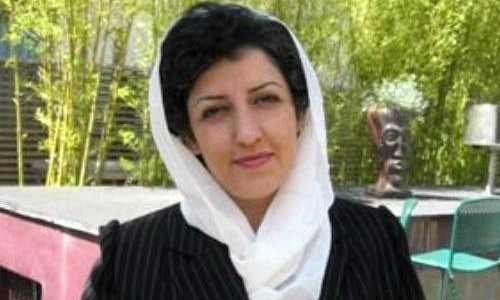Invitation
Many of you have been following the news and updates about Narges Mohammadi. Unfortunately, her situation has worsened after her transfer (or better: exile) to Zanjan prison. Like other political prisoners, she is also endangered by the coronavirus epidemic. Therefore, we will hold a twitter storm for her on March 19, on the eve of the Persian New Year Nowruz. Please join us on twitter from 6.30 pm (Central European Time) onwards.
Stop Narges Mohammadi’s exile to Zanjan prison, save her from the coronavirus crisis, better free her unconditionally!
Basic instructions:
- Please follow our account @UnitedForNarges. You can copy our tweets or write you own messages (also in other languages).
- Use the hashtags #MaydayNarges (new hashtag for the twitter storm) and #FreeNarges.
- You can also include other fitting hashtags, for example: #Nowruz #coronavirus #Iran #humanrights
- Of course, you can also show support on other social media platforms.

Background information
In December 2019, Narges Mohammadi was violently transferred from Tehran’s Evin prison to Zanjan, which is about 300 kilometers away from the Iranian capital. In a letter, she later wrote that she had been tossed into an ambulance by a group of women and men including Evin prison director Gholamreza Ziaei. During the whole drive she was bleeding from the wounds she sustained from this mistreatment. Due to pre-existing health problems, Narges relies on blood thinners which makes her highly vulnerable to injuries.
Narges’ exile can be seen as an act of punishment. Prior to her transfer, on December 21, she and seven other women political prisoners in Evin Prison had expressed their solidarity with the mothers of victims of state violence.
The conditions in Zanjan prison, where Narges is being held now, are even worse than those she endured in Evin. Especially the medical facilities are very poor. As Narges wrote in her letter, “they do not even have medicine against a cold”. In view of the coronavirus crisis, her mother said that Narges could not obtain disinfectants, even though she would have paid for them.
Narges is also deprived of vital social contacts. According to her husband, Taghi Rahmani, she is not allowed to receive in-person visits. The weekly phone calls with her children, granted after her 2016 hunger strike, have already been cancelled for more than half a year. Due to the exile, her ties with other prisoners of conscience were also cut off. Even books and other belongings were taken away from her.
According to a database provided by the human rights organization United For Iran, Narges is currently the only female political prisoner in Zanjan prison. That is, she is held among regular convicts, some of whom are dangerous criminals. Drug consumption and fights are common inside the prison. Her mother stated that Narges was recently subjected to sexual and physical threats by another inmate.
It should be noted that Narges stayed in Zanjan prison already during a previous prison term. Her health condition deteriorated so much during that time that she was released on bail in 2013, to be able to undergo medical treatment. In 2015, she was rearrested despite her ongoing illness, and the remaining sentence was added to the current one.
Iran is among the countries most heavily hit by the coronavirus epidemic, with one of the highest death rates. (Official figures apparently do not reflect the true number of victims.) The judiciary recently stated that about 85,000 prisoners were temporarily released to prevent the spreading of the virus in prisons. However, few political prisoners, and none few of the arrested dual nationals and foreign academics, have been granted prison leave so far.
The conditions for Narges Mohammadi in Zanjan prison are unbearable. She is an innocent human rights defender and deserves to be released immediately. At the very least, she should be granted medical furlough.
Sources:
- Jailed Activist’s Mother Warns About Threats Of Physical, Sexual Abuse In Iran Prison Radio Farda
- Human Rights Advocate Battered in Iran’s Evin Prison Radio Farda
- “They Know That Moving Her to This Prison Could Kill or Paralyze a Human Rights Activist” Center for Human Rights in Iran
- Narges Mohammadi Hospitalized in Prison (from 2012) Center for Human Rights in Iran
- Unjustly Jailed Human Rights Watch
Information in other languages:
- En Iran, les prisonniers politiques seuls face au coronavirus Marianne
- Hafturlaub nur für wenige politische Gefangene im Iran Deutsche Welle
- Irans Zivilgesellschaft im Schatten der Krise Deutsche Welle






























 a) Nazanin Zaghari-Ratcliffe was born on 26 December 1978. She is a British-Iranian dual national and worked as project manager for the Thomson Reuters Foundation, a charitable arm of the news agency Thomson Reuters. She is married to Richard Ratcliffe. They have a daughter Gabriella who turned three on 11 June 2017. Richard and Gabriella are both British citizens.
a) Nazanin Zaghari-Ratcliffe was born on 26 December 1978. She is a British-Iranian dual national and worked as project manager for the Thomson Reuters Foundation, a charitable arm of the news agency Thomson Reuters. She is married to Richard Ratcliffe. They have a daughter Gabriella who turned three on 11 June 2017. Richard and Gabriella are both British citizens.
